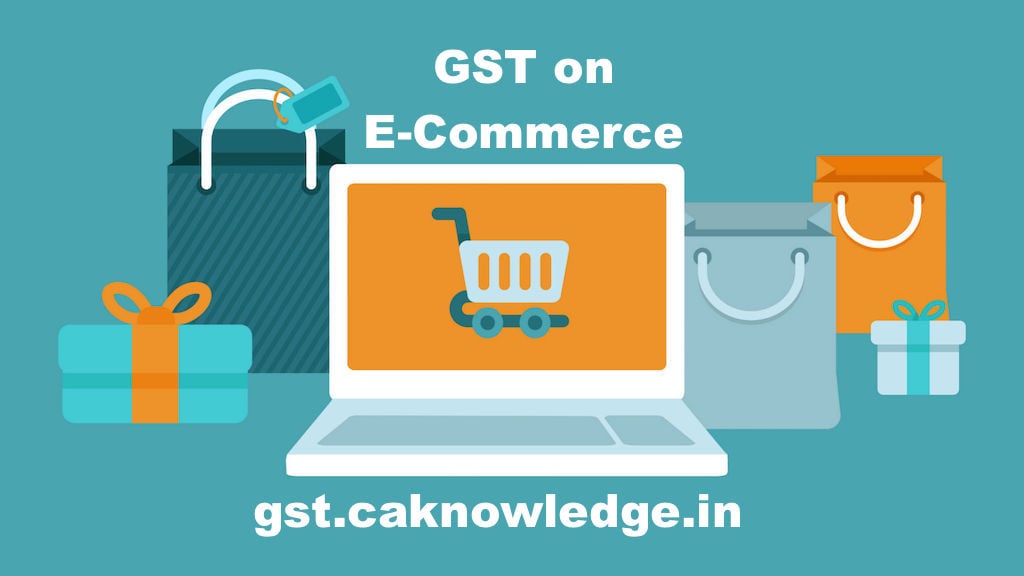GST on E-Commerce Transactions, GST on Electronic Commerce. E-Commerce has been always a matter of confusion and ambiguity with respect to taxation aspect. This article will deal with GST (Goods and Service Tax) levy provision with respect to E- Commerce transactions. Recently we provide complete details forGST Registration,GST Login Procedure, GST Rates 2018, GST Return Online Process, GST Refund Details, HSN Code List etc…Now check more details about “GST on E-Commerce Transactions” from below…
GST on E-Commerce Transactions
Why taxing E-Commerce Transactions is particularly difficult?
- Existence of multiple parties to transactions. For e.g. For Flipkart, there are almost around 10-12 major categories divided into much more subcategories.This will yield so many dealers trading through Flipkart platform with numerous customers.This really creates a huge burden to identify and implicate the tax liability for service providers or sellers.
- Digital platform makes it difficult to trace boundaries with respect to taxation territory, where the transaction involves parties from various countries.For .e.g. Amazon.com, which prevails in various countries, involving sellers and customers from such regions.
- Multiple phases during a transaction will make it difficult to determine the taxing event.for e.g. when an Indian customer buys a product from American seller , there could be online payment , after which there would be delivery and after such delivery , the transaction will close.It is difficult as to determine whether this transaction will be taxed on initiating or payment or on delivery.
E-commerce :Place of Supply
Services Provided by E-comm Operator to supplier
- Place of Supply of Service – Gen Rule will apply – Always location of Service receiver – since compulsory registration.
Services Provided by E-comm Operator to supplier of transportation of goods
- Place of Supply of Service – Sec 12(9) of IGST Act
- location of Service receiver(if registered) or
- location at which such goods are handed over for their transportation
Supply of goods/Provision of Service by supplier to customer
Advertisement
Content in this Article
- For Goods: Place of Supply – Where movement of goods terminates for delivery.
- For Services: to registered person(B2B) : Registered address of recipient : to unregistered person(B2C): Address on record of person
Situation of E-Commerce platforms under GST law and their impact
The Government has announced and proposed a levy under GST framework for E- Commerce transactions. According to the Draft GST law, the Digital platform which perform E- Commerce services will be liable to collect TCS (Tax Collected at Source) from the suppliers. The E – Commerce platforms will also responsible for filing the period returns.
Supplier and E-commerce platform –The return filed by the E-Commerce platform with respect to supplies will be matched with individual supplier returns.In case of any discrepancy, the tax liability under GST will be redetermined. This will raise the cost of compliance of the E-Commerce platform.
Small scale business liability –The TCS collection by digital platform from supplier is regardless the threshold for the small scale business. This would require even small businesses (below tax threshold)to pay the tax and later apply for refund. This will hamper thin margins on which the suppliers are transacting , because it will bring down the profit margin by increased cost of compliance.
Cancellation or return policy –TCS in advance will result in taxation event before materialization of sale transaction.In case of cancellation or return policy, TCSalready collected will need to be applied for as refund or will be considered for netting off the tax liability. This will result in paying interest on own capital by the digital platform.This would hamper the working capital cycle for both E-Commerce operator and suppliers.
Where E-Commerce sells at discount -In case of sale at discount, the E-Commerce platform will collect tax on full value. This would add to tax burden on the E-Commerce platform as it will pay tax on full value but will be selling at lower prices (after discount).
CONCLUSION
GST framework will be replacing all goods and service related indirect taxes like VAT, Service tax etc. Even though , the tax liability on e-Commerce transactions can not be denied, it can surely be sophisticated by categorising the same for B2B and B2C transactions.It will also be interesting to see how the tax jurisdiction and tax liability will be determined with respect to E-Commerce transactions.
Must Read –
- GST Refund
- GST Return
- GST Forms
- GST Rate
- GST Registration
- What is GST?
- GST Invoice Format
- ITC under GST
- HSN Code
- GST Login
- GST Rules
- GST Status
- Track GST ARN
- Time of Supply
if you have any query regarding “GST on E- Commerce Transactions” then please tell us via below comment box…


HSN or SAC Code on Service of E-Commerce
HSN or SAC Code on Service of E-Commerce
HSN or SAC Code of GST on Service of e commerce
HSN or SAC Code of GST on Service of eCommerce Platform
i am supplier on ecommerce selling online only no shop i have.How to do GST Registration and VAT Registration I don’t have
i am supplier on ecommerce selling online only no shop i have.How to do GST Registration and VAT Registration I don’t have
If digital plat form connecting supplier of goods & service and buyer , whether digital platform owner will be treated as E.Commerce operator under GST ? Although Supplier and buyer got connected through digital platform , all further supply and buying contract i.e. rate negotiation and finalising the deal will happen in between supplier and buyer, may be online through digital platform or off line. Buyer will directly make the payment to supplier (no payment through digital platform ) Whether such digital platform service will be covered under the definition of E.Commerce operator and liable to pay tax for supply done by the supplier to Buyer and also liable to collect tax ?
whether supplier need to register under irrespective his turn over since he is using someone’s digital platform for expansion of business